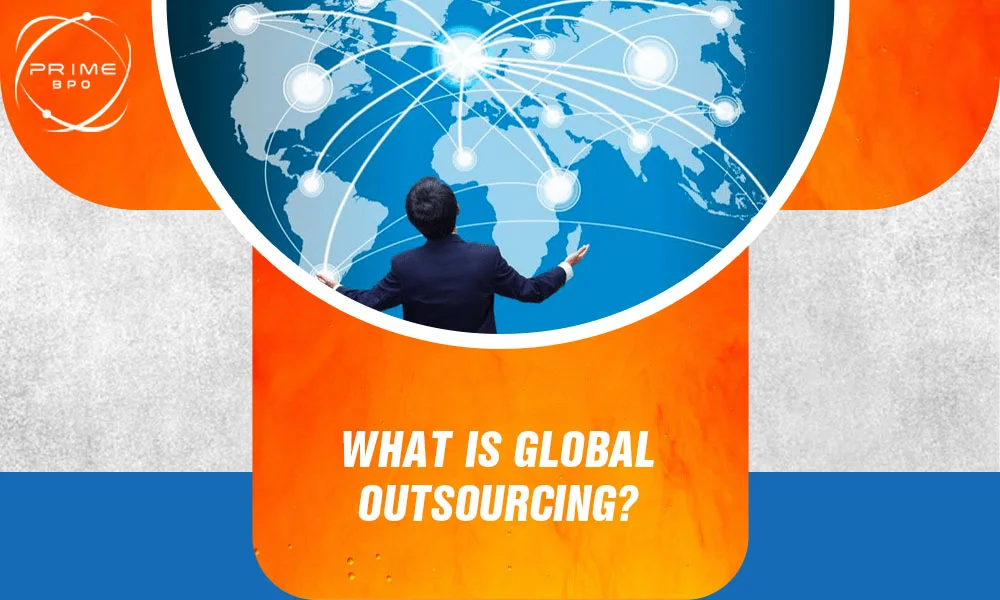Key Points
- Global outsourcing services offer cost savings, access to talent, and 24/7 operations.
- Solutions like global payroll outsourcing and global employment outsourcing simplify international growth.
- Worldwide outsourcing trends highlight AI, nearshore models, and data security.
- Choosing the right international outsourcing provider will make sure that your company will get the compliance, scalability, and long-term success.
Global Outsourcing - A Complete Guide for Businesses
Today, Global outsourcing is not only about saving money anymore. Instead, companies use it to grow quickly, work in better ways, and find skilled people from around the world. When businesses work with international outsourcing companies or offshore BPO providers, they can spend less, make work easier, and give more time to the most important things.
In this guide we will discuss and explore the role of international outsourcing services, the benefits of global outsourcing, current worldwide outsourcing trends, and why more companies are turning to international providers. We’ll also break down specialized solutions such as global payroll outsourcing, global employment outsourcing, and global recruitment process outsourcing (RPO).
What Is Global Outsourcing?
Global outsourcing means that you are giving your business tasks or services to companies that are working in other countries. It is different from local outsourcing because it lets businesses reach more skilled workers, also lower costs, and work around the world 24/7. A international outsourcing company is working with your business like a partner that will help with services such as IT, HR, customer support, payroll, finance, and also hiring. These providers most of the time connect directly with the client’s systems, so the work feels smooth and easy, no matter where the company is located. This way, businesses can grow, save money, and use worldwide talent without worrying about distance.
Get Free Quotes
Customized Options Await
Global business outsourcing has become increasingly prevalent in today's globalized economy, enabling businesses to adapt to changing market dynamics and remain competitive in their respective industries.
The Benefits of Global Outsourcing
There are so many benefits of international outsourcing companies that will help your business to grow. Lets have a look at what benefits this provides.
1. Cost Efficiency
The most important benefit of international outsourcing is that it saves money and when companies are doing the certain tasks they prefer the country that has the low cost so they spend less and use the extra money to improve and grow their businesses with new ideas.
2. Access to Global Talent
A global outsourcing provider helps businesses find skilled workers from different parts of the world. This means companies can hire the right experts without worrying about location or distance.
3. 24/7 Productivity
With international outsourcing, companies can work in a “follow-the-sun” model. For example, a U.S. company can keep business running even at night, because teams in Asia or Europe continue the work while U.S. employees are asleep.
4. Flexibility and Scalability
Outsourcing will help the business to do work quickly so they dont have any burden of hiring and training the in house team and staff. International outsourcing services allow the business to grow and step into the new markets with minimal risks.
5. Focus on Core Business
By outsourcing these tasks such as payroll or employment services, the companies can free up time and focus on their main goals and important strategies for growth.
Key Global Outsourcing Services
When a business works with an outsourcing company, it usually gets many helpful services. Here are some of the most common ones:
1. Global Payroll Outsourcing
Handling payroll in different countries can be a difficult task because each has its own tax rules and laws. Global payroll outsourcing makes all these things easier by making sure that the employees everywhere are paid correctly, on time, and in full compliance.
2. Global Employment Outsourcing
Global employment outsourcing, that is also called Employer of Record (EOR) services, this will let companies to hire the workers in other countries without setting up a local office. This will help your businesses expand globally faster and more easily.
3. Global Recruitment Process Outsourcing (RPO)
Global recruitment process outsourcing help your businesses to find and hire the new employees from the different countries. The outsourcing companies make the hiring smooth and easy and your work is handled from the skilled employees.
4. Global Business Process Outsourcing (BPO)
Global business process outsourcing covers areas like customer service, finance, HR, and IT support. Businesses that outsource BPO functions save costs and improve service delivery.
5. Offshore Outsourcing Solutions
There are so many companies that choose offshore outsourcing for IT, software development, and tech support. Countries such as India, the Philippines, and Eastern Europe are top choices for these tasks because they have many skilled workers.
Global Outsourcing Companies and Agencies
There are thousands of international outsourcing companies all around the world, and each is offering you the expert services. These companies often get the best position as the global outsourcing agency that are capable of delivering the customized services.
Some international outsourcing providers focus on technology services like IT and software, while there are some other who focus on handling the back-office tasks, HR, or customer support. The best provider is one that matches a company’s goals, industry, and legal requirements.
Worldwide Outsourcing Trends
The outsourcing industry is growing very fast and also changing with new technology and global connections. Here are some important worldwide outsourcing trends that are shaping the market:
AI and Automation
Outsourcing companies use AI to work faster, reduce mistakes, and improve customer service.
Nearshore Outsourcing
Working with nearby countries is growing because this will be easier to manage time zones and communication.
Specialized Skills
Businesses look for experts in areas like cybersecurity, data analytics, and digital transformation.
Data Security
Companies who are providing the services it's important for them that they have to follow global data protection rules such as GDPR and CCPA when outsourcing the tasks.
Hybrid Models
Many mix in-house, offshore, and nearshore outsourcing companies to balance global benefits with local control.
Get Free Quotes
Customized Options Await
Advantages of Global Outsourcing for Different Industries
Outsourcing is no longer limited to IT or call centers. Lets have a look at how different industries use international outsourcing solutions:
-
Healthcare
Outsourcing tasks like writing medical reports, handling billing, and giving telemedicine support.
-
Finance
Using services like global payroll and accounting helps businesses follow laws and stay compliant with rules.
-
Retail & E-commerce
Getting help with customer service, delivery, and marketing.
-
Technology
Working with outsourcing partners for software building and IT support.
Outsourcing in Globalization
Outsourcing plays a big role in globalization. When businesses grow into other countries, they use outsourcing to:
- Enter new markets faster
- Follow local rules and laws correctly
- Grow their teams without opening local offices
- Lower the risks of expanding worldwide
How to Choose the Right Global Outsourcing Provider
Choosing the right international outsourcing company is very important. Look at their skills, like payroll or hiring support. Check if they follow global rules and keep data safe. Make sure they can grow with your business, use new technology, and have a good reputation with trusted brands.
The Future of Global Outsourcing
In the future, international outsourcing will keep changing as companies look for both savings and new ideas. We will see more AI-based services, remote-first models, eco-friendly practices, and stronger partnerships between providers and clients. Outsourcing will not just save money but also drive business growth worldwide.
Get Free Quotes
Customized Options Await
Conclusion
Working with a international outsourcing company gives your business a lot of success and also you can access the companies that are best doing this work all across the world. Just you have to make sure that you are choosing the right outsourcing company and go for the company that follows the new trends wisely and succeed in the global market.
Start your outsourcing journey now. Talk to PrimeBPO’s experts and discover how we can streamline your operations.
FAQS
1. What is global outsourcing?
Global or international outsourcing means that you are giving business tasks to other company that work outside your country anywhere in the world. This process will save money, find skilled workers, and work more efficiently.
2. What are the three types of outsourcing?
The main types are:
- Onshore outsourcing – that work within the same country.
- Nearshore outsourcing –that work in a nearby country.
- Offshore outsourcing – that work in a faraway country.
3. Is global outsourcing good or bad?
It can be very good because it saves money and gives access to talent worldwide. But it can also be hard to manage time zones and communication.
4. What is global outsourcing sometimes called?
Global outsourcing is sometimes called international outsourcing or offshore outsourcing.






